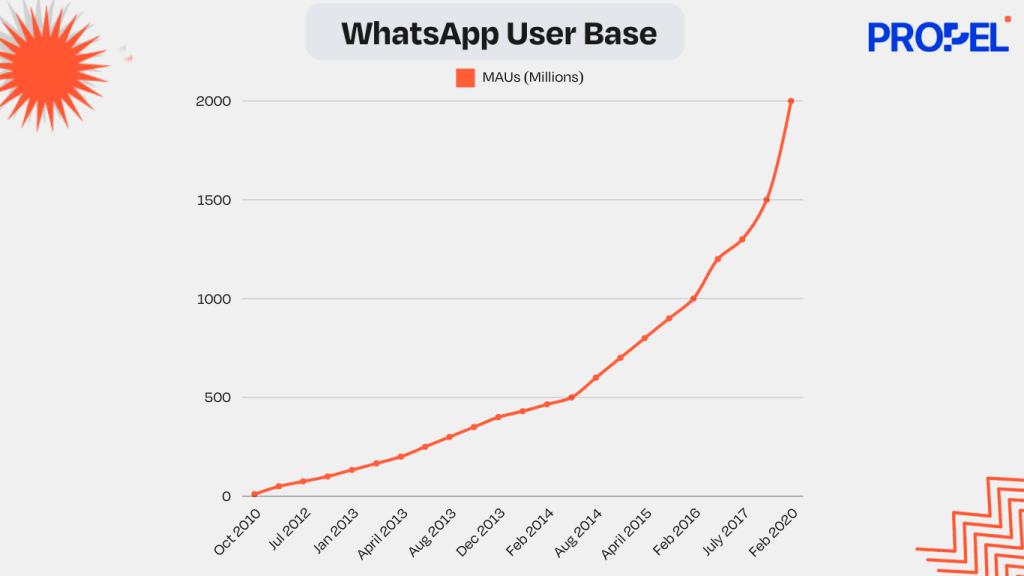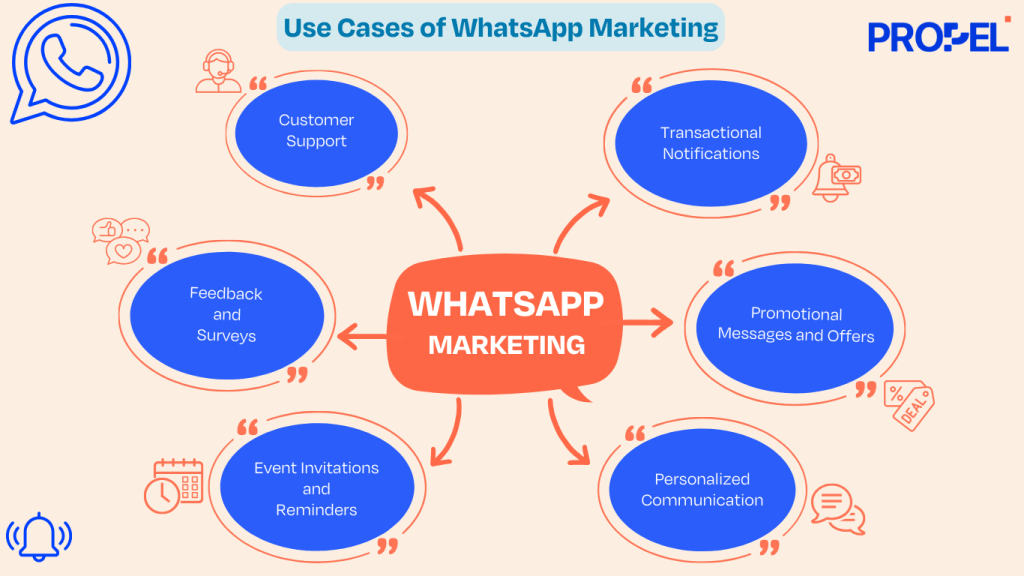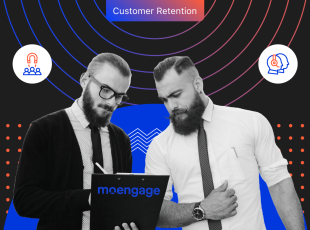Navigating the ever-evolving digital landscape can be a daunting task, especially for business owners. However, by understanding and harnessing the power of the various digital channels at their disposal, businesses can ensure strategic and thoughtful growth. One such channel that has revolutionized the business world is WhatsApp. Read on to discover how the world’s most popular messaging app has transformed the way businesses interact with customers.
As per latest figures:
These numbers clearly indicate the reach of WhatsApp and it’s potential as a marketing tool that businesses can’t afford to ignore.

Description: Exponential growth in WhatsApp user base over time. Source.
To effectively utilize WhatsApp marketing, it’s essential to understand how the platform fits into different stages of the Customer Journey. From initial awareness to post-purchase support, WhatsApp can play a crucial role in guiding customers through their journey with a brand.
By providing timely, relevant, and personalized communication, businesses can build stronger relationships with their customers, leading to increased satisfaction and loyalty. Leveraging the power of Marketing Automation helps eradicate the repetitive tasks at every level like renewal reminders, customized offers, inserting the name of the user or their preferences in personalization and so on.
WhatsApp provides a direct line to customer support, making it easier for customers to get help. Businesses can use WhatsApp to:
Provide real-time support, answering customer queries promptly.
Send automated replies to common questions, reducing response times.
Share multimedia content like videos and images to resolve customer issues.
For instance, companies like Netflix and Uber leverage WhatsApp to send updates and support messages, ensuring customers have instant access to information
Have you ever booked a flight or ordered food and received a confirmation via WhatsApp? This is becoming increasingly common. Businesses use WhatsApp to:
Send order confirmations and delivery updates, keeping customers informed.
Allow customers to track their orders in real time.
Provide booking confirmations for services like hotels and travel.
By doing so, businesses not only keep customers informed but also improve their overall experience.
WhatsApp is a powerful platform for sending promotional messages. Businesses can:
Share exclusive deals and offers with their WhatsApp subscribers.
Send personalized discount codes to loyal customers.
Launch new products by sending sneak peeks and early access offers.
For example, companies have seen significant engagement increases by sending promotional content directly to customers’ WhatsApp.
WhatsApp allows businesses to create a more personalized communication channel with customers. Through WhatsApp, businesses can:
Address customers by name and send tailored messages based on their interests.
Use customer data to recommend products or services that match their preferences.
Provide a personalized shopping experience, increasing customer loyalty

Description: Multi-engagement messaging routes using WhatsApp Business.
Collecting customer feedback is crucial for any business. WhatsApp makes this process simple and effective. Businesses can:
Send surveys to customers after a purchase to gather feedback.
Use WhatsApp to conduct quick polls and gain insights into customer preferences.
Analyze feedback to improve products and services.
With high open rates, WhatsApp surveys can yield more responses than traditional email surveys.
Businesses can use WhatsApp to manage event invitations and send reminders. This further results in high attendance rates and engagement. By using WhatsApp for event management, businesses can:
Send Invitations: Quickly invite customers to events, webinars, or product launches with personalized messages.
Provide Event Details: Share important details like event schedules, venue locations, and agendas directly through WhatsApp.
Send Reminders: Automated reminders can be sent to ensure that attendees don’t forget about the event, increasing turnout.
This approach is particularly effective for businesses that host frequent events, workshops, or special promotions, as it keeps attendees informed and engaged.
Transactional notifications via WhatsApp keep customers informed about their transactions, building trust and transparency. Businesses can use WhatsApp for:
Sending Payment Receipts: Customers receive immediate confirmation of their payments. This reduces the need for follow-up inquiries.
Notifying About Shipping Updates: Real-time shipping notifications inform customers about the status of their deliveries.
Alerting About Account Activities: Banks and financial institutions can use WhatsApp to notify customers about account activities. These activities include withdrawals, deposits, or suspicious activity.
These transactional messages provide valuable information. This reduces customer anxiety and increases satisfaction with the service provided.
Many B2C companies have successfully integrated WhatsApp for a seamless customer experience. Brands have successfully launched campaigns that have not only increased brand visibility but have also actively driven sales. A few notable examples are:
Businesses have been known to have experienced a 5X increase in sales after adopting WhatsApp for customer interactions with 3X increase in repeat customers and a 5X increase in customer inquiries compared to previous email channels. By providing 24/7 support through WhatsApp, businesses have seen a reduction in customer churn rates. Quick responses to queries foster loyalty and prevent frustration. Studies show that 82% of consumers expect immediate responses to routine inquiries, which WhatsApp effectively fulfills.
Further, writing a compelling WhatsApp copy will genuinely pique the audience’s interest and drive them towards action. Thus integrating WhatsApp helps increase customer satisfaction all the while contributing to business growth!

Rushabh Menon is a seasoned B2B growth and product marketing leader currently heading GTM strategy at Propel. With a strong foundation in strategic planning and execution, he is known for his analytical approach and commitment to impactful, data-driven marketing. An alumnus of IIT Madras and IIM Shillong, Rushabh brings valuable expertise in driving market expansion with a focus on continuous learning and improvement.
Got Questions? We Have Answers!
WhatsApp marketing enhances customer journey management by providing personalized, real-time communication at every stage—from awareness to post-purchase. With high open and click-through rates, WhatsApp helps businesses engage customers effectively, boosting satisfaction and retention.
Key use cases for WhatsApp in lifecycle management include customer support, order updates, personalized promotions, feedback collection, and event reminders. Each of these uses strengthens customer relationships and improves engagement across the customer journey.
WhatsApp marketing is highly effective for customer engagement due to its 98% open rate and 45-60% click-through rate. Its instant communication capabilities allow businesses to provide timely updates, personalized offers, and support, making it ideal for maintaining strong customer connections.
Businesses can use WhatsApp to boost customer retention by sending personalized messages, exclusive offers, and loyalty rewards. Additionally, it’s a great tool for re-engaging inactive customers through tailored reminders and feedback requests, which encourage repeat purchases.
Successful examples include Airbnb’s "Host Assist" for real-time support, Coca-Cola’s "Share a Coke" campaign for engagement, and HDFC Bank’s loan offers through WhatsApp. These initiatives demonstrate how brands can leverage WhatsApp to enhance customer experience and drive loyalty.


Propel specializes in customer lifecycle marketing, helping consumer brands boost retention & reduce churn with tailored strategies and our AI-augmented platform, AURA.
Book a call with our experts and get started today!